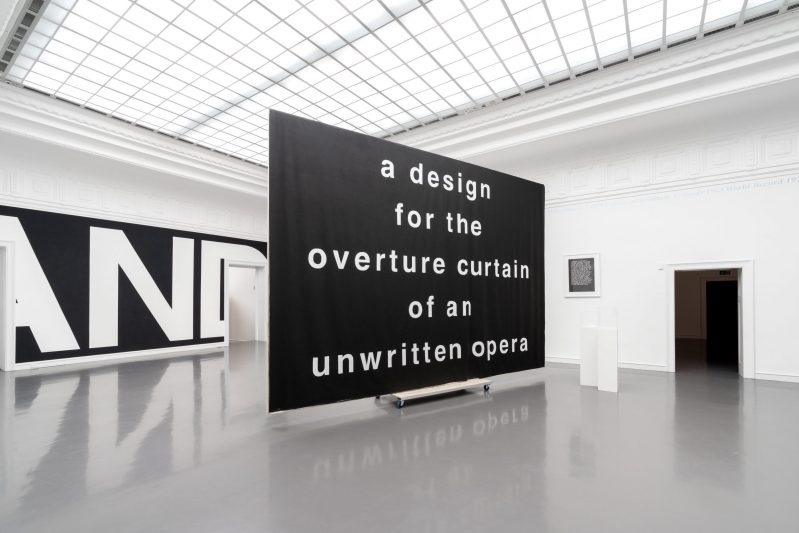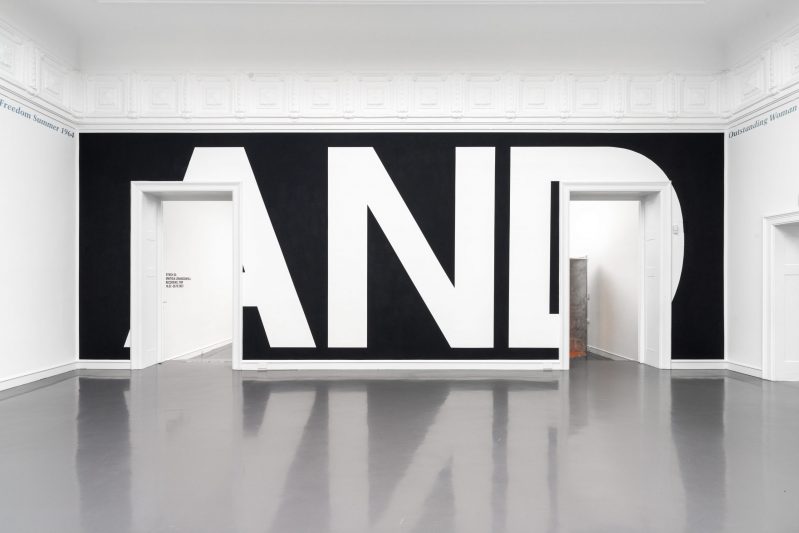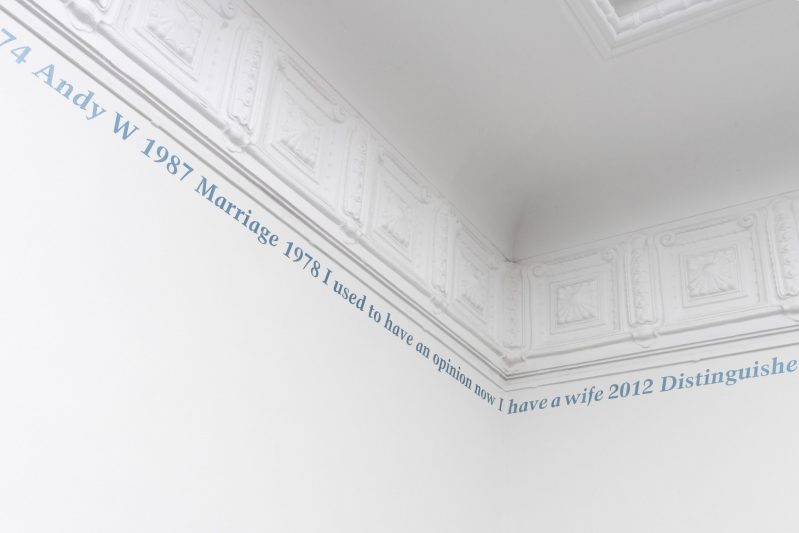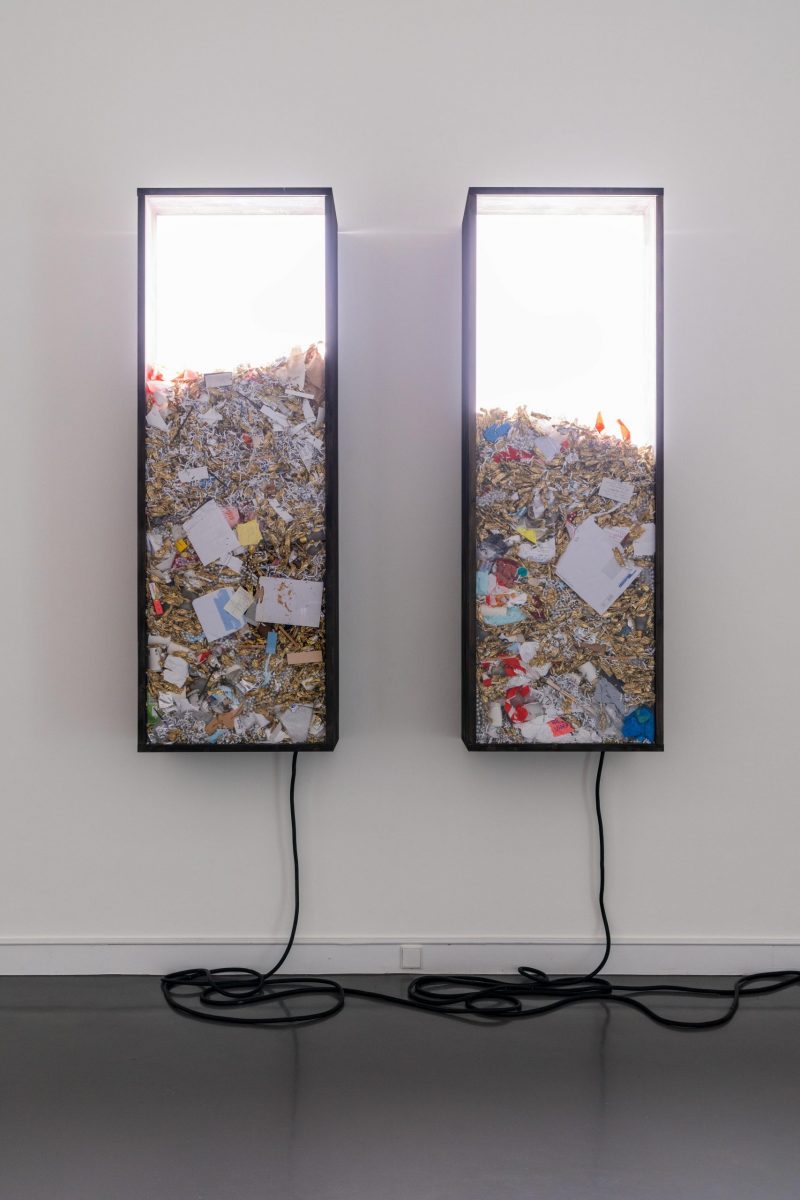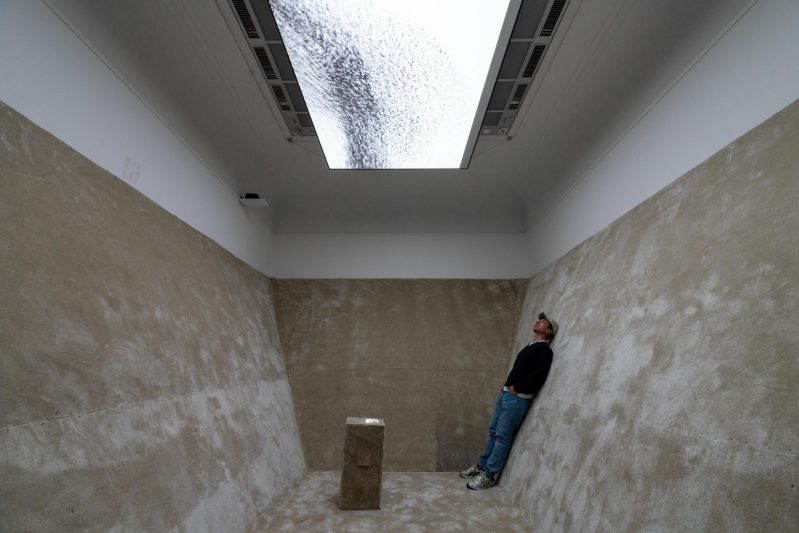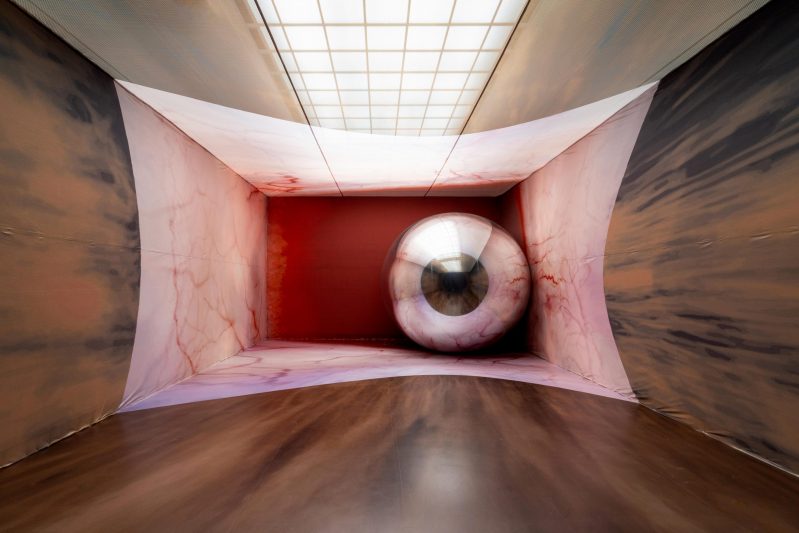Auditions for An Unwritten Opera
Around the works by Mutlu Çerkez
Artists
- Antonia Baehr
- Juliet Carpenter
- Mutlu Çerkez
- Julian Dashper
- Egemen Demirci
- Léuli Eshrāghi
- Marco Fusinato
- Pedro Gómez-Egaña
- Delia Gonzalez
- Félix González-Torres
- Özlem Günyol & Mustafa Kunt
- On Kawara
- Hanne Lippard
- Callum Morton
- Serkan Özkaya
- Ruth Wolf-Rehfeldt
- Jeff Wall Production
Curator
- Misal Adnan Yıldız
Curatorial assistance
- Arhun Aksakal
Publication
Printed Matter and other exhibition materials are designed by Kunsthalle’s long-term collaborator Stuttgart-based collective Matter Of as a tribute to Çerkez’s typographic work. Utilizing the research and the making of this exhibition as an editorial process, there will be a publication published by Hatje Cantz to be launched 2024 in Australia.
Thanks to
We acknowledge the financial support for Serkan Özkaya’s new production and travels by the Canada Council for the Arts.
The Staatliche Kunsthalle Baden-Baden is an institution of the state of Baden-Württemberg under the auspices of the Baden-Württemberg Ministry of Science, Research and the Arts.

“… I began to title each of my works with a date from the future that would fall during my possible lifetime. I would undertake to repeat each work in some way on its particular date. Every work would reappear at some later point during my life’s work. My work would not evolve, or at least the gradient of its evolution would be flat. It is a system where I can consciously fool myself that all my works are mature works. And working within this system I would, in fact, objectively use my own life’s work as its own subject matter.” Mutlu Çerkez
For the first time in two decades, from July 14 to October 8, 2023, Staatliche Kunsthalle Baden-Baden reintroduces the multi-layered oeuvre of the artist Mutlu Çerkez (1964-2005) to a larger audience. Presenting an experimental exhibition format, Auditions for an Unwritten Opera unfolds a solo presentation into a constellation of installations and exhibits. Selected works by Çerkez are shown in dialogue with contemporary practices including those of Juliet Carpenter, Jesse Darling, and Hanne Lippard, alongside relevant historical positions such as On Kawara, Ruth Wolf-Rehfeldt, and Felix Gonzalez-Torres, among others.
We live in times when spaces for grief have been reduced to moments of interaction on social media. The politics of desire and technologies of pleasure are shifting our economy of attention to screen-navigated zones and self-centered stimulation. However, this cannot replace the true meaning of shared joy. Connecting the exhibition space to emotional intelligence, the collective unconscious, and conceptual thinking, this exhibition becomes a mental space between joy and grief.
Works by Mutlu Çerkez are recalled to investigate the ways in which:
- the life of an artist reflects on the exhibition history of an institution;
- the development of a work and how it is made interacts with future generations;
- currency of conceptual thinking with its soundness, relevancy, and contemporaneity is still valid. These forms, research materials, and artistic productions are brought together in compositions which invite the participants and visitors to shape, share, and reclaim future scenarios together.
To this end, the exhibition departs from an unexpected protagonist from the antipodean past and aims to remember, reintroduce, and rediscover the artist Mutlu Çerkez in the European context.
Borrowing its title from a key piece by the British-born, Australian-Turkish Cypriot artist, this exhibition is inspired by the uniqueness of his approach to titling. Often giving his works, not a standard title, but one based on a future date upon which they would be remade, he proposed for them a new form of life, veering conceptually from their momentary narration, production, or materiality.
Çerkez is an excellent protagonist to create a room for reflection, collective studio practice, and expanded stage to question our relationships with the future; our connections with the present art canon, and our position in relation to those missing chapters of art history. This exhibition is not only about the legacy of an early loss, but an emphasis on rehearsal, work in progress, daily practice, and exercise without final results, conclusions, renders, or destinations.
Auditions for an Unwritten Opera
Like no other genre, opera reflects on the duality of life and death; moreover, An Unwritten Opera as an artwork is inviting, encouraging, and stimulating for radical poetics of current contemporary practices. Being a form of conundrum, it has a rare aspect of aporia.
This exhibition, therefore, revisits an artist who continually inquired about one specific form: an unwritten opera as a conceptual piece. Historically speaking, the artist dedicated almost a decade to inquiries in the form of a series of props and makeup design studies to his Unwritten Opera between 1992 and 2000 and investigated variations of album covers for bootleg recordings of Led Zeppelin. Çerkez continued practicing the Unwritten Opera by extending its forms and materiality to a painting surface, or the Marshall guitar amp favored by Jimmy Page (Untitled: 14 July 2030, presented as “stage furniture/props for an unwritten opera” in 1999), or to its content: a curtain inscribed with those words and Auditions for an Unwritten Opera of 2000, an exhibition consisting of video documentation of the exhibition’s opening.
As a conversation piece, the leading work A Design for the Overture Curtain of an Unwritten Opera, Untitled: 15 January 2028 (1999)—also shown as part of the 6th Istanbul Biennial, Turkey (1999)—is positioned as a key reference for the dramaturgy and choreography of the exhibition considering the narrative politics and gestures of movement and direction in the show.
Çerkez’s oeuvre guided the research and the exhibition process, appearing alongside works from a new wave of queer, critical, and radical practices that pose questions about acts of rehearsal, the state of works in progress, and an artist’s life as a biography of transition. The exhibition’s subtitle proposes “around” instead of an expression such as “about.” “Around” refers to circling, gathering, and staying together. Scoring, rehearsals, cognitive exercises, music notes, and other forms of conceptual thinking especially with works by Antonia Baehr, Delia Gonzalez, Julian Dashper, and Marco Fusinato operate as leitmotifs based on different chapters of understanding the life of an artist as well as the span of artwork. The collaborative works by Mutlu Çerkez with Marco Fusinato and Callum Morton will be shown in the exhibition.
Juliet Carpenter, an artist shortlisted for the Walters Prize 2024, presents a new film made in collaboration with Róisín Berg, The Sun is Not To Be Believed. The film is displayed within a site-specific installation named Meantime (Duration is to Consciousness as Light is to the Eye). The recent work by Turner Prize 2023 nominee Jesse Darling will be shown within this project, including a room dedicated to a conceptual dialogue between two Berlin-based artists, Hanne Lippard, winner of the Preis der Nationalgalerie 2023, and Ruth Wolf-Rehfeldt, winner of Hannah Höch Prize in 2022. Together with these artists, the exhibition proposes rethinking forms of reincarnation, reproduction, regeneration, and remembering within the limits of human memory, the process of memorizing, and escapes of forgetting.
Selected recent works by Pedro Gómez-Egaña and Serkan Özkaya have been adapted to the Kunsthalle’s exhibition space with site-specific parameters and new museological concerns, generating physical links to the exhibition’s narrative considering our gaze, human anatomy, and dynamic relationships between the body and the institution. Two different works by Özlem Günyol & Mustafa Kunt, both almost a decade old, are revisited on the occasion of the tenth anniversary of the Gezi Park Protests. Their associations with transformation of public space are inspiring for understanding the 2000s as opposed to the 1990s zeitgeist, for example the mutation of street language—before the Internet, or singularity of a political subject, which come together with the works by Çerkez as extended poesie.
Egemen Demirci, who worked with the Kunsthalle Baden-Baden for two years as “Hauskünstler” (artist at work), a temporary position to engage artists with paid hours into the institutional framework, revisits his work from 2012, Spectator on White. In the video work, spectators go through imaginary artworks recalled from memory, invisible to the viewer of the video. The remake of the existing work in 2023 within the neoclassical architecture of the Kunsthalle as a state-run art institution, in a heritage building and in the city of Festspiele, Kurhaus, Friedrichsbad, and others, establishes a potent relationship with Çerkez’s Unwritten Opera, maybe even as the missing libretto.
A co-commission by Staatliche Kunsthalle Baden Baden, Museum of Contemporary Art, Tallawoladah/Sydney, the Plimsoll Gallery, University of Tasmania, nipaluna/Hobart, and Aupuni Space, Honolulu, Léuli Eshrāghi presents their new dual channel video work, afiafi, which expressly connects with Mutlu Çerkez’s paintings on DNA structures, through their DNA of queer and indigenous poetic and performative acts.
The assembly of these unique works is possible through generous loans from Monash University Museum of Art | MUMA, Melbourne, Felix Gonzalez-Torres Foundation, Staatsgalerie Stuttgart, Griffith University Art Museum, Australia, Anna Schwartz Gallery, Melbourne, PALAS, Australia, Michael Lett Gallery, Auckland, Sultana Gallery, Paris, Zilberman Gallery and ChertLüdde, Berlin, and Hot Wheels Athens.
By way of long hours of professional exchanges and patience with Charlotte Day, Marco Fusinato, Callum Morton, and other colleagues of Çerkez; moreover Pierre Bal Blanc, Florian Lüdde, and Andrew Kachel, further substantial art historical connections with Çerkez’s legacy of are knitted together through the presentation of works by On Kawara, Jeff Wall Production, Ruth Wolf-Rehfeldt, and Felix Gonzalez-Torres, among others.
Curated by Misal Adnan Yıldız
Curated program
Auditions for An Unwritten Opera
Around the works by Mutlu Çerkez
Spectral Arrows
Durational Performance by Marco Fusinato
The Last Question
Performance by Pedro Gómez-Egaña
Tontanz
Performance by Antonia Baehr & Jule Flierl
Afiaf left - Afiaf right
Performance by Léuli Eshrāghi
In Remembrance
Performance by Delia Gonzalez
